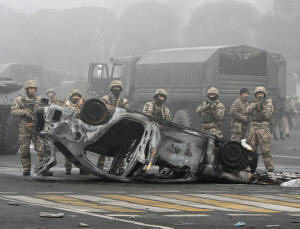Russia sends troops to Kazakhstan to put down deadly uprising
 Send a link to a friend
Send a link to a friend
 [January 06, 2022]
By Olzhas Auyezov [January 06, 2022]
By Olzhas Auyezov
ALMATY (Reuters) -Russia sent paratroopers
into Kazakhstan on Thursday to help put down a countrywide uprising
after deadly violence spread across the tightly controlled former Soviet
state.
Police said they had killed dozens of rioters in the Central Asian
country's main city Almaty. State television said 13 members of the
security forces had died, including two found decapitated.
A presidential residence and the mayor's office in the city were both
ablaze, Reuters journalists said. By Thursday afternoon, the city's
airport, seized earlier by protesters, was under firm control of
military personnel. Burnt out cars littered the streets.
Earlier on Thursday, several armoured personnel carriers and scores of
troops had entered the main square of Almaty, and gunshots could be
heard as troops approached the crowd, Reuters correspondents reported
from the scene. Later, the square appeared peaceful, with 200-300
protesters still gathered and no troops around.
Unverified video on social media showed troops patrolling Almaty's foggy
streets overnight, firing weapons, as well as widespread looting in the
city. Masked protesters, some carrying shields and batons apparently
seized from police, marched through billowing tear gas along a
tree-lined avenue, to the sound of detonations.
The internet had been shut down across the country and the full extent
of the violence was impossible to confirm. But the unrest was
unprecedented for Kazakhstan, ruled firmly since Soviet times by leader
Nursultan Nazarbayev, 81, who had held on to the reins despite stepping
down three years ago as president.

"ATTACK ON OUR CITIZENS"
Nazarbayev's hand-picked successor, President Kassym-Jomart Tokayev,
called in forces from ally Russia overnight as part of a Moscow-led
military alliance of ex-Soviet states. He blamed the unrest on
foreign-trained terrorists who he said had seized buildings and weapons.
"It is an undermining of the integrity of the state and most importantly
it is an attack on our citizens who are asking me... to help them
urgently," he said.
Moscow said it would consult with Kazakhstan and allies on further
measures to support the Kazakh authorities' "counter-terrorist
operation" and called the uprising a foreign-inspired attempt to
undermine the country's security by force.
Neither Kazakhstan nor Russia provided evidence to support the claim of
foreign involvement.
The secretariat of the Russian-led Collective Security Treaty
Organisation said advanced units of Russian paratroopers were in the
country and had "already begun to fulfil their assigned tasks."
Troops being sent included units from Belarus, Armenia, Tajikistan and
Kyrgyzstan as well as Russia, the secretariat said. It did not disclose
the overall size of the force.
The uprising, which began as protests in the west of the country against
a New Year's Day fuel price hike, had swelled dramatically on Wednesday,
when protesters stormed and torched public buildings in Almaty and other
cities. They chanted slogans against Nazarbayev, and in at least one
case looped ropes around a bronze statue of him, trying to pull it down.
[to top of second column]
|

Troops are seen at the main square where hundreds of people were
protesting against the government, after authorities' decision to
lift price caps on liquefied petroleum gas, in Almaty, Kazakhstan
January 6, 2022. REUTERS/Mariya Gordeyeva
 Tokayev initially responded by
dismissing his cabinet, reversing the fuel price rise and distancing
himself from his predecessor, including by taking over a powerful
security post Nazarbayev had retained.
But the actions failed to mollify crowds who accuse Nazarbayev's
family and allies of amassing vast wealth from oil and minerals
while the nation of 19 million remained poor.
Nazarbayev stepped down in 2019 as the last Soviet-era Communist
Party boss still ruling a former Soviet state. But he and his family
kept posts overseeing security forces and the political apparatus in
Nur-Sultan, the purpose-built capital bearing his name. He has not
been seen or heard from since the unrest began.
The swift arrival of Russian troops demonstrated the Kremlin's
strategy of rapidly deploying force to safeguard its sphere of
influence in the ex-Soviet Union. Since late 2020, Russia has shored
up the leader of Belarus in the face of a popular uprising, halted a
war between Azerbaijan and Armenia, and, to the alarm of the West,
massed again near Ukraine, which Russia invaded eight years ago.
The protesters "are Kazakhs, and Tokayev will try putting them down
with Russian troops. That will not look great for Moscow," tweeted
economist Tim Ash, who specialises in the region.
Western countries have called for calm. Neighbour China called the
events an internal matter for Kazakhstan.
Under Nazarbayev, Kazakhstan gained a reputation for stability,
attracting large-scale foreign investment. Though political
opposition was firmly curtailed, the state was regarded as less
repressive and volatile than ex-Soviet neighbours.
Kazakhstan's dollar-denominated sovereign bonds suffered fresh falls
on Thursday. Longer dated issues have plunged, losing around 7 cents
since the start of the week.
Kazakhstan is the top global producer of uranium, and the unrest
prompted an 8% jump in the price of the metal that fuels nuclear
power plants. Rival producers in North America saw their share
prices surge, including Canada’s Cameco, up nearly 12% so far this
year.
Kazakh uranium miner Kazatomprom said on Thursday it was operating
normally with no impact on output or exports.

The country is also the world's second-largest miner of bitcoin
after the United States. Bitcoin's "hashrate" - the measure of
computing power of machines plugged into its network - dropped by
over 10% on Wednesday after Kazakhstan's internet was shut off,
according to crypto mining firm BTC.com.
(Reporting by Mariya Gordeyeva, Pavel Mikheyev, Olzhas Auyezov and
Polina DevittWriting by Mark Bendeich, Peter Graff Editing by Angus
MacSwan and Frank Jack Daniel)
[© 2022 Thomson Reuters. All rights
reserved.] This material may not be published,
broadcast, rewritten or redistributed.
Thompson Reuters is solely responsible for this content. |